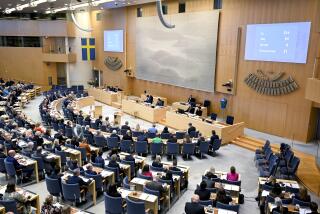Proposal in Sweden’s Parliament : Bill Takes Swipe at Church-State Bond
- Share via
STOCKHOLM — In the Swedish countryside, where pine forests are thick and people are few, the local parish of the Swedish Lutheran Church is more than a meeting place or a house of worship. It is an arm of government.
For 400 years state and church have been limbs of the same body. Even today the soaring steeple of a brick church in a village or Arctic outpost may mark the only contact point with the authorities for hundreds of miles.
So it was natural that the parish in Stromsnasbruk, then a town of 3,000, recorded Gosta Hedberg’s birth 69 years ago. Like every other Swede, his life will be chronicled in the church’s registers, from baptism to burial.
“If I need a document about my personal status for a driver’s license, I have to go to the church to get it,” he said.
Legislation Pending
Now a bill is pending in Parliament to remove the civil registry from the church and give it to the tax authorities.
If it passes, the bill would drive the first wedge between church and state. It is a shift in tactics by those who failed in the past to separate the two with a single legislative strike.
Opposition has been so strong, however, that action on the bill has been delayed until after Parliament’s summer recess. Conservatives say the registration system has worked smoothly for centuries and that changing it would cost millions.
Moreover, the church-state link “is very much part of our culture,” said Gote Ekstrom, spokesman for the Center Party, which is leading the opposition. “For many people, the church is the center of their lives.”
Action Called Overdue
For Gosta Hedberg, a member of the Mission Covenant Church of Sweden, which broke away from the national church 110 years ago, the action is long overdue.
He maintains that the church infringes on religious freedom and is a form of coercion for all Christians to belong to the state church.
The Lutheran Evangelical Church has dominated Scandinavia since the 16th Century Reformation. In Sweden, it claims 92% of the population as members, although some belong to one of the 36 other Christian denominations known as “free churches.”
But a recent survey indicated that only one in 10 Swedes attends church services at least once a month, and a booklet for immigrants describes Sweden as one of the world’s most secularized nations.
Many Links
Church and state are linked at many levels. Income tax includes an ecclesiastical tax, which brings in as much as 5 billion kroner ($800 million) a year to the church.
Non-church members get a 70% discount, but they still pay toward registration and funerals, which also are in church hands.
Further deepening the links, the government appoints and pays the bishops of the 13 dioceses, and the official head of the church is King Carl XVI Gustaf.
Candidates for local church councils run in public elections representing political parties.
‘Important Role’
Political dependency may inhibit clerics from being more active in civic affairs, Parliament member Per Arne Aglert, a liberal, said.
“The church has an important role to play,” he said, “and it is not playing it very well because it cannot speak against the state.”
Church and state at one time were bound by about 450 laws. Until the last century, everyone had to belong to the church and take part in communion at least once a year or face expulsion.
Some laws were repealed 100 years ago by the Dissenters Act. But an end to discrimination and full religious freedom was not legislated until 1951.
Church Still Powerful
Religion has faded as a force in daily life, but the church is still powerful.
“It reaches more people than sports, and far more than the labor unions,” Anders Nyman, an adviser in the church’s legal bureau, said.
More to Read
Sign up for Essential California
The most important California stories and recommendations in your inbox every morning.
You may occasionally receive promotional content from the Los Angeles Times.













